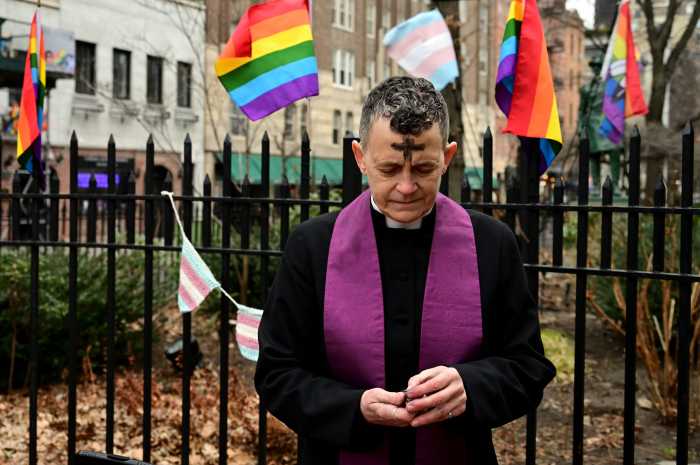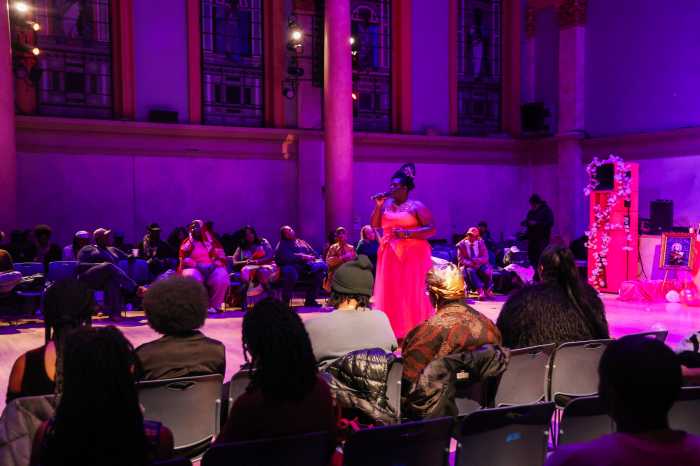There are serious actors, and then there is Shirley Knight, currently appearing in the world premiere of Tennessee Williams’ fascinating final play, “In Masks Outrageous and Austere. ”
I met her in her cozy Upper West Side apartment, where she told me, “I love doing this play, but it’s a huge part. I’m not an actress who just learns the lines, decides how she’s going to say them, and blah blah blah. If that’s what you want, okay, fine, but you don’t hire me. Tennessee once said something about me and my relentless pursuit of the truth. I’m like a bear and can’t bear not to have every aspect of the mosaic.
“When I did ‘Kennedy’s Children’ for five months on Broadway and went on tour, it was in San Francisco, our second to last stop, that I came off stage and said, ‘Okay, I got her. I can stop doing her now,’ which is why I did ‘Streetcar’ twice. I needed to do my work on it. I don’t give performances; I get to have another rehearsal.”
Of her character in this new play (at the Culture Project, 45 Bleecker St. at Lafayette St., through May 25; cultureproject.org), Knight said, “She’s unbelievably angry. She’s been controlled her whole life. We don’t hear anything about her mother, but I think she was somehow drowned. It’s something I made up, but it’s useful to me. I think what Tennessee was trying to convey is the trap of being privileged and having money and what that does to this imperious woman who tries very hard to be the person in charge. And she never is, for all the status and money.”
Although Knight has rarely spoken of it, she was very close to Williams: “I first met him briefly when I did the film of ‘Sweet Bird of Youth,’ and then my husband at the time produced two of his plays in San Francisco and I got to know him quite well. We were very simpatico, and he came to see me perform a lot.
“I did ‘Come Back, Little Sheba,’ and, honestly, it was tired. It didn’t resonate, and I was so surprised when they revived it recently. Tennessee came to see it, and we went out afterward. He’d had a couple, and he said, ‘Oh, honey, it’s probably good that Bill [Inge, the playwright] is gone. He’d have realized that this one should have been left on the shelf.
“One opening night, he sent me these very beautiful ceramic roses, and he wrote, ‘A rose is a rose is a rose. When I think joyfully of theater, it will always be of you as well. Tenn.’ What can you say? He wrote ‘A Lovely Sunday for Creve Coeur’ for me, and two other actresses, actually, Barbara Baxley and Maureen Stapleton. The three of us read the play, and he was beside himself to think we were going to do it. But Barbara got another job and couldn’t, and he asked Maureen at the reading, ‘Are you gonna do it, honey?’ And she said, ‘No, because Shirley has all the cookies!’ And in a way, it was true: I had the lead, and she was the secondary part.
“It was a very sweet play, but it was basically a one-act, and I begged Tennessee and [producer David] Merrick to let me do ‘Suddenly, Last Summer’ with it. That way they’d see Shirley in all her sweetness, the angelic Shirley Knight, and also in ‘Suddenly.’ But, no, they didn’t want to, and if they’d listened to me, it would have gone to Broadway.”
Of John Guare’s wonderful “Landscape of the Body,” Knight said, “I was so good in that part! I’m sorry, that was another part I was born to play. We were so successful in Chicago and did it at the Public, and knew we were going to move to Broadway. But all the critics got together that week and said ‘Let’s kill John Guare.’ So extraordinary, because, to me, that’s his best play, better than ‘Six Degrees of Separation.’
“It caught what was going on in the Village then. We lived on Washington Street, around the corner from Ramrod Bar, and a car went through our window. My children went to the Little Red Schoolhouse, and they walked on Christopher Street every day. One day, my daughter Caitlin came home from the seventh grade, slammed her books down, and threw herself on the sofa. She said, ‘You know, Mom, I can stand leather and chains for breakfast. I can stand leather and chains for lunch. But leather and chains for breakfast, lunch, and dinner is simply too much!’”
Tasty is the best description I have for Rachael Sage’s new CD, “Haunted By You.” It’s a magnificently arranged song cycle, dealing with love in all its myriad forms, featuring lush melodies, resonant lyrics, and Sage’s beautifully versatile, womanly voice pulling it all together.
She showed up at Gemma restaurant for our interview, the very image of the hyper-chic, funkily thrown-together New York artiste, and said, “I really wanted to write a song cycle about passion from all different angles. Obviously, music is perceived as the manifestation of passion, and I wanted to approach the concept from a romantic point of view, as well as others.
“The first track, ‘Invisible Light’ I wrote after the break up of a four-year relationship. I was in that place where I was so liberated on one front, but also stuck. I had lost that ability to be creative because I had gotten so used to somebody else’s presence in my life and space. So that was a love song to the creative muse that enables you to sit down and make a painting or poem, to really listen to what your own voice is telling you.
“It told me to pick up the guitar, which is not my instrument, but which had been lying around in a case collecting dust. I picked it up, refreshed my memory on a handful of chords, took a couple of lessons, and composed this song on the guitar.
“The second track, “Abby Would You Wait,’ is about somebody I met at a house concert in Texas. The wonderful thing is you’re literally in someone’s home, performing for their friends who’ve come because they love indie music. I met this very captivating woman during intermission. I’m the kind of person that if I get an idea, I just have to write it down immediately. I quickly wrote it, and the great thing about a pop song is you’re able to expand your imagination. I did see her again and told her about it, and she heard the song and was thrilled.
For Sage, an OUTMusic Award-winner, queer identity is something she has felt comfortable with since coming out in college.
“Luckily, my family was really accepting and supportive. Early on, when I met with some big record labels, they were excited about that and all about positioning me as this ‘queer artist,’ which I just found kind of gross. So I decided to go my own way and start producing myself, as well as other new artists, and this is my tenth CD.”
“Judy Collins heard my music and invited me to open for her, which was such an honor as she has always been an idol of mine. It’s so great to hear her at the Café Carlyle, where it’s really intimate and she’s totally comfortable, singing and telling these great stories. I have to admit I did not know who Eric Burdon was when he called me about playing with him. My bassist was so disgusted with me, and said, ‘He was the lead singer of the Animals!’ I said, ‘Oh I know them!’ and immediately went to Tower Records –– when it was open –– and bought everything of his I could. He’s so amazing, at his age, still full of energy and enthusiasm and a love of being onstage. I agree with you that he’s completely underrated in the business, such a survivor who tours all the time.”
Sage, who was born in Port Chester, New York, is a true Renaissance woman. Her performance skills were honed early on, when she trained in ballet but did not continue, as her parents, sticklers for education, put the kibosh on thoughts of a career in that field for her.
“It was hard to accept at first,” she said, “but then I got the acting bug, which was another way of expression.”
Before switching to music, she studied drama at Stanford and still keeps her hand in acting, with a recent Lincoln Center appearance.
“After this, my tenth CD,” she said, “I feel like I’ve said everything I want to for a while and would love to explore acting possibilities more.”
She’s also a visual artist, which is evident from the exquisite packaging of “Haunted By You,” which evokes Pre-Raphaelite artists as well as John Singer Sargent, and her work is being shown at Think Coffee (1 Bleecker St. at Bowery) through June 3. Most importantly, you can see her perform at Joe’s Pub on May 19 at her CD release party (9:30 p.m., 425 Lafayette St., btwn. E. Fourth St. & Astor Pl.; joespub.com).
Diane Keaton, resplendent in white Ralph Lauren satin tux, walked out to tumultuous applause at the 92nd Street Y on May 1, to promote her memoir, “Then Again.” The crowd was packed with the kind of Manhattan women d’un age certain, who you just knew have long held Keaton as their own highly relatable muse. The star, who years ago would seem a nervous basket case on talk shows, has now evolved into a highly confident public speaker, completely comfortable with herself and the audience.
She not only read from her blazingly intelligent, honest book, but showed film compilations of her career as well as home movies of her two adopted kids and beloved mother –– the inspiration for her memoir –– in her moving transformation from “perfect” California homemaker to Alzheimer’s victim. Keaton was full of juicy revelations, naming Jack Nicholson as her best onscreen kisser (though Sam Shepard really blew her hair back and Keanu Reeve, while too young, wasn’t bad, either).
Everyone was given a copy of her book, and damned if she didn’t sit down afterwards and sign every single one of them. She remembered that I helped her with her book “Still Life” years ago, when I was working at Movie Star News for Paula Klaw (legendary for having tied up Bettie Page and photographing her). On a blustery day, Keaton walked into the shop, threw her leather satchel bag on the floor, which opened wide, revealing its entire chaotic contents, and asked to see every color still from the 1950s-60s we had. (“It’s Annie Hawwll!,” Paula screamed, before demanding an autographed picture.)
This was at the height of her Warren Beatty affair –– I could only imagine what her nights were like –– and there was never anyone as funkily glamorous as she was then. Even with major sniffles into a ratty Kleenex, she was as seductive as shit, as we’d hang, shoulder to shoulder, bopping agreeably to the WBLS disco on the radio (D Train’s “You’re the One For Me” really got her rocking) and sifting through ancient manila folders filled with the cheesiest shots imaginable of the cheesiest stars –– Ronnie Reagan, Jane Wyman, Virginia Mayo, Doris Day, et al. Her eye, then as now, was lightning quick; her judgment, sure, impeccable, and fascinating.
Contact David Noh at Inthenoh@aol.com.


































